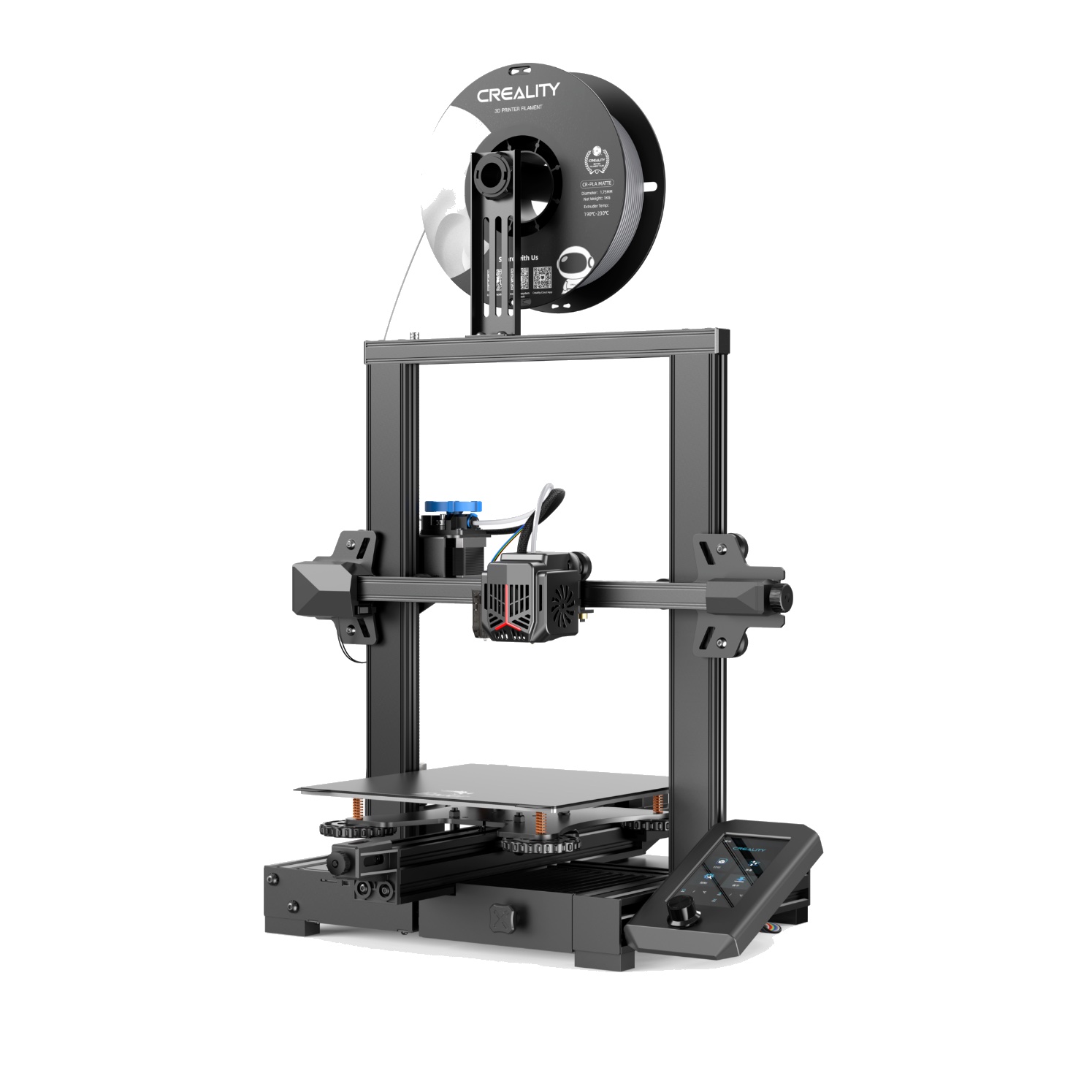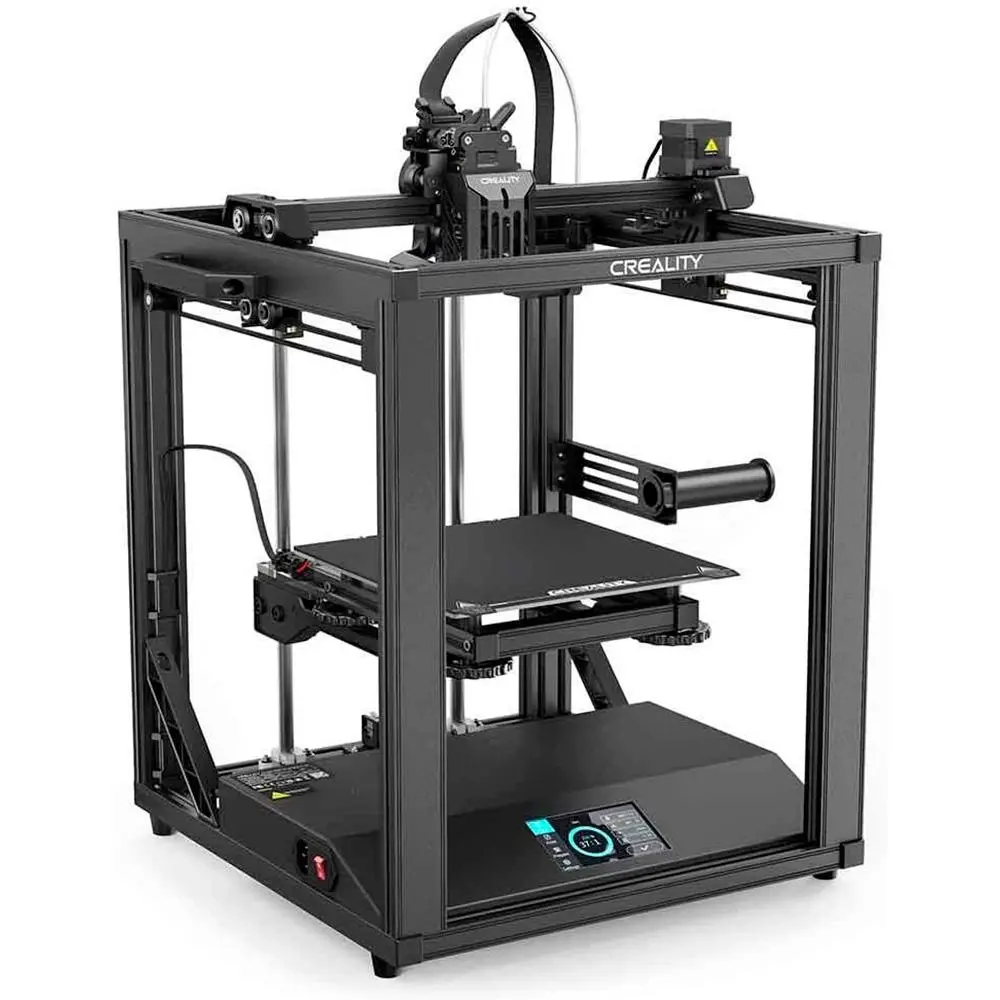Compare Ender 3 V2 Neo vs Ender 5 S1
Comparison between the best 3D printers
Choose the best 3D printer at the best price. The cheapest 3D printers are here.
Buy a 3D printer here with 3D Fila.
 |
 |
|
| Model | Ender 3 V2 Neo[BUY Ender 3 V2 Neo] |
Ender 5 S1 |
| Printing Material | Filament | Filament |
| Buy Filament for Creality 3D Ender 3 V2 Neo | Buy Filament forCreality 3D Ender 5 S1 | |
| Estimated price | $310,00 | $467,00 |
| Manufacturer | Creality 3D | Creality 3D |
| Release Year | 2022 | 2022 |
| Print Volume [mm] | 220x220x250 | 220x220x280 |
| Printer Size [mm] | 438x424x472 | 425x460x570 |
| Weight [kg] | 9,8 | 12,1 |
| Power Loss Recovery | YES | YES |
| Enclosed printer | NO | NO |
| Bed Leveling | Automatic | Automatic |
| Filament End Sensor | YES | YES |
| Bed type | Heated | Heated |
| Power supply system | Bowden | Direct Drive |
| Standard nozzle | 0,4 | 0,4 |
| Maximum Nozzle Temperature [°C] | 260 | 300 |
| Maximum Bed Temperature [°C] | 100 | 110 |
| Maximum printing speed [mm/s] | 80 | 250 |
| Filament holder | YES | YES |
| Camera for supervision | NO | NO |
| Recommended filaments | PLA, PETG | PLA, ABS, PETG, TPU, PC, ASA, HIPS |
| Recommended slicers | Cura, Simplify, Slic3r, IdeaMaker | Cura, Simplify, Slic3r, IdeaMaker |
| Maximum Resolution [mm] | 0,1 | 0,05 |
| Processor | 4.2.2 mainboard | 32 Bits |
| Display | Display touchscreen 4,3'' | Display touchscreen 4,3 '' |
| Power Supply | 350 W | |
| Connectivity | SD / USB | SD / USB / Wi-Fi |
| Operating systems | Windows, Mac, Linux | Windows, Mac, Linux |
| Date of registration in the system | 2022-12-09 | 2023-10-04 |
| Release date | 2022 | 2022 |
| Extra features | The Ender 3 V2 Neo printer stands out for its automatic bed leveling with the CR Touch system, ensuring high-quality initial layers. It features an all-metal Bowden extruder for increased durability and improved filament handling. Its flexible, PC-coated magnetic build plate makes it easy to remove prints and is durable and easy to clean. It also includes a new user interface with model preview and an updated gantry design. The Ender 3 V2 Neo maintains the same build volume and temperatures as the previous version, supporting popular filaments such as PLA and ABS. It features a quiet 32-bit mainboard and additional features such as a filament sensor, print recovery, simple 3-step assembly, an integrated toolbox, and belt tensioners. | A steel drive shaft synchronizes the two Y-axis belts. High-torque 42-48 Y-axis motor for responsive and precise movement. Cartesian structure. Enhanced stability by thick linear shafts, extra stiffeners, two cantilevers, and silicone bumpers. Double Die Spring profile reinforcement. Silicone bed support. All-metal Sprite direct extruder. Best for printing with flexible filaments like TPU. Auto-calibration with 16-point CR Touch. Compatible with Sonic Pad, Wifi Box, and Camera kit. |
| Support for multiple colors and materials (AMS and CFS) | NO | NO |
Notes * |
||
| Cost-benefit | 6 / 10 | 7 / 10 |
| Hardware | 2.4 / 10 | 2.4 / 10 |
| Tela | . | . |
| Print volume | 3 / 10 | 3 / 10 |
| Performance | 0 / 10 | 2 / 10 |
| [BUY Ender 3 V2 Neo] |
Conclusion |
| **Conclusion** When comparing the Ender 3 V2 Neo and the Ender 5 S1, both printers showcase impressive features and functionalities for their respective price points. The Ender 3 V2 Neo stands out for its value, offering reliable performance and a robust design that caters well to beginners and hobbyists. Its automatic bed leveling and user-friendly features make it accessible, while the moderate print volume is sufficient for many projects. On the other hand, the Ender 5 S1, albeit at a higher price, provides notable advantages in terms of print speed and maximum nozzle temperature, making it more suited for advanced users who require efficient production and versatility with different filament types, including TPU and ABS. Its direct drive system enhances the ability to handle flexible materials, which is a significant benefit for users looking to experiment with various filaments. Overall, if budget considerations and ease of use are paramount, the Ender 3 V2 Neo may be the more attractive option. However, for those who are willing to invest more for enhanced performance and capabilities, the Ender 5 S1 justifies its higher cost with its superior features and expanded material compatibility. Ultimately, the decision should be based on individual needs, intended usage, and budget constraints. |

